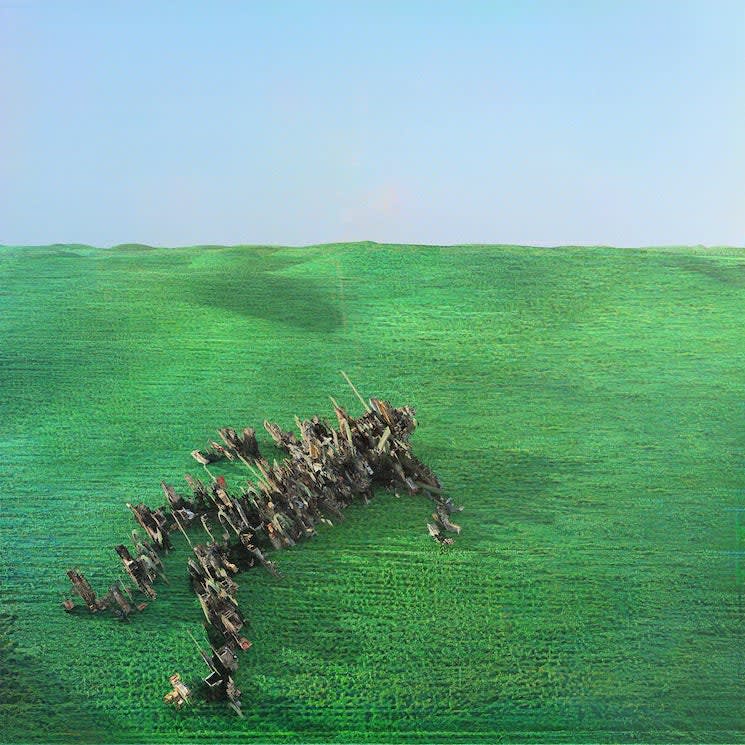When Squid were forced out of their gigging circuit because of the pandemic, they were also removed from their de facto focus groups: bars and venues around England where they'd test new tunes, experiment on stage and gauge their audience's reaction. As the global lockdowns of 2020 set in, they went underground — literally — to Speedy Wunderground producer Dan Carey's basement studio and set out to record their debut full-length album, Bright Green Field.
The ambitious, experimental outing from the English five-piece, who have harnessed the brighter side of post-punk's pop sensibilities, represents a shift in not only the group's process, but also within the genre.
It's easy to draw comparison to Squid's contemporaries on their full-length effort; the record finds the band teaming up with Carey, whose influence on Bright Green Field is mirrored in the works of the producer's other English buzz-rock collaborators including black midi. There are also parallels in Squid's sound to the likes of Parquet Courts, Protomartyr and IDLES, as well as veteran post-punk/new wave outfits like Talking Heads and Joy Division.
All these groups share a similar frenetic agitation, and often, a sense of restlessness and displeasure with society at large; but where Squid's predecessors lean toward solemn, grey sonic palettes, the Brighton-formed band latch onto brighter, optimistic tones. There's no mistaking that the group demonstrate critical views through drummer/vocalist Ollie Judge's dystopian, industrial lyricism, but they've presented much of their politics through infectious, danceable riffs and electronic experimentation, ditching the monotone, binary formulae of the past.
Eight-minute standout "Narrator," featuring the undulating siren call of guest vocalist Martha Skye Murphy, is the record's clear winner, but it's no anomaly. "G.S.K." falls mostly in line with the album's foundations in painting industrial soundscapes. Driving mid-album slapper "Paddling" is likely the purest instance of Judge's signature bossy lyricism, while closer "Pamphlets" (one of many album cuts touting a seriously lengthy runtime) is an undoubtedly rebellious decry of the status quo.
On Bright Green Field, Squid offer a response to the dance-rock of the early-aughts' call. Their sprawling, tangential compositions — rooted in groovy, pulsating drum lines, sassy-yet-authoritative vocals and resounding brass — are destined for indie dance parties of the near-future's post-vaccine nightlife. And where the album's more erratic moments are bookended by remarkable restraint, making space for the band to soothe their own anxieties, they forge a new path for post-punk's optimistic future.
Removed from the institution of performance, they've taken a step back from the genre's plague of cool-for-coolness-sake. Here, they embrace vulnerability, taking time to address modern issues (read: symptoms of capitalism), while also imbuing a real sense of fun, artistic merit and instrumental democracy in the record's 11 tracks.
(Warp)The ambitious, experimental outing from the English five-piece, who have harnessed the brighter side of post-punk's pop sensibilities, represents a shift in not only the group's process, but also within the genre.
It's easy to draw comparison to Squid's contemporaries on their full-length effort; the record finds the band teaming up with Carey, whose influence on Bright Green Field is mirrored in the works of the producer's other English buzz-rock collaborators including black midi. There are also parallels in Squid's sound to the likes of Parquet Courts, Protomartyr and IDLES, as well as veteran post-punk/new wave outfits like Talking Heads and Joy Division.
All these groups share a similar frenetic agitation, and often, a sense of restlessness and displeasure with society at large; but where Squid's predecessors lean toward solemn, grey sonic palettes, the Brighton-formed band latch onto brighter, optimistic tones. There's no mistaking that the group demonstrate critical views through drummer/vocalist Ollie Judge's dystopian, industrial lyricism, but they've presented much of their politics through infectious, danceable riffs and electronic experimentation, ditching the monotone, binary formulae of the past.
Eight-minute standout "Narrator," featuring the undulating siren call of guest vocalist Martha Skye Murphy, is the record's clear winner, but it's no anomaly. "G.S.K." falls mostly in line with the album's foundations in painting industrial soundscapes. Driving mid-album slapper "Paddling" is likely the purest instance of Judge's signature bossy lyricism, while closer "Pamphlets" (one of many album cuts touting a seriously lengthy runtime) is an undoubtedly rebellious decry of the status quo.
On Bright Green Field, Squid offer a response to the dance-rock of the early-aughts' call. Their sprawling, tangential compositions — rooted in groovy, pulsating drum lines, sassy-yet-authoritative vocals and resounding brass — are destined for indie dance parties of the near-future's post-vaccine nightlife. And where the album's more erratic moments are bookended by remarkable restraint, making space for the band to soothe their own anxieties, they forge a new path for post-punk's optimistic future.
Removed from the institution of performance, they've taken a step back from the genre's plague of cool-for-coolness-sake. Here, they embrace vulnerability, taking time to address modern issues (read: symptoms of capitalism), while also imbuing a real sense of fun, artistic merit and instrumental democracy in the record's 11 tracks.
